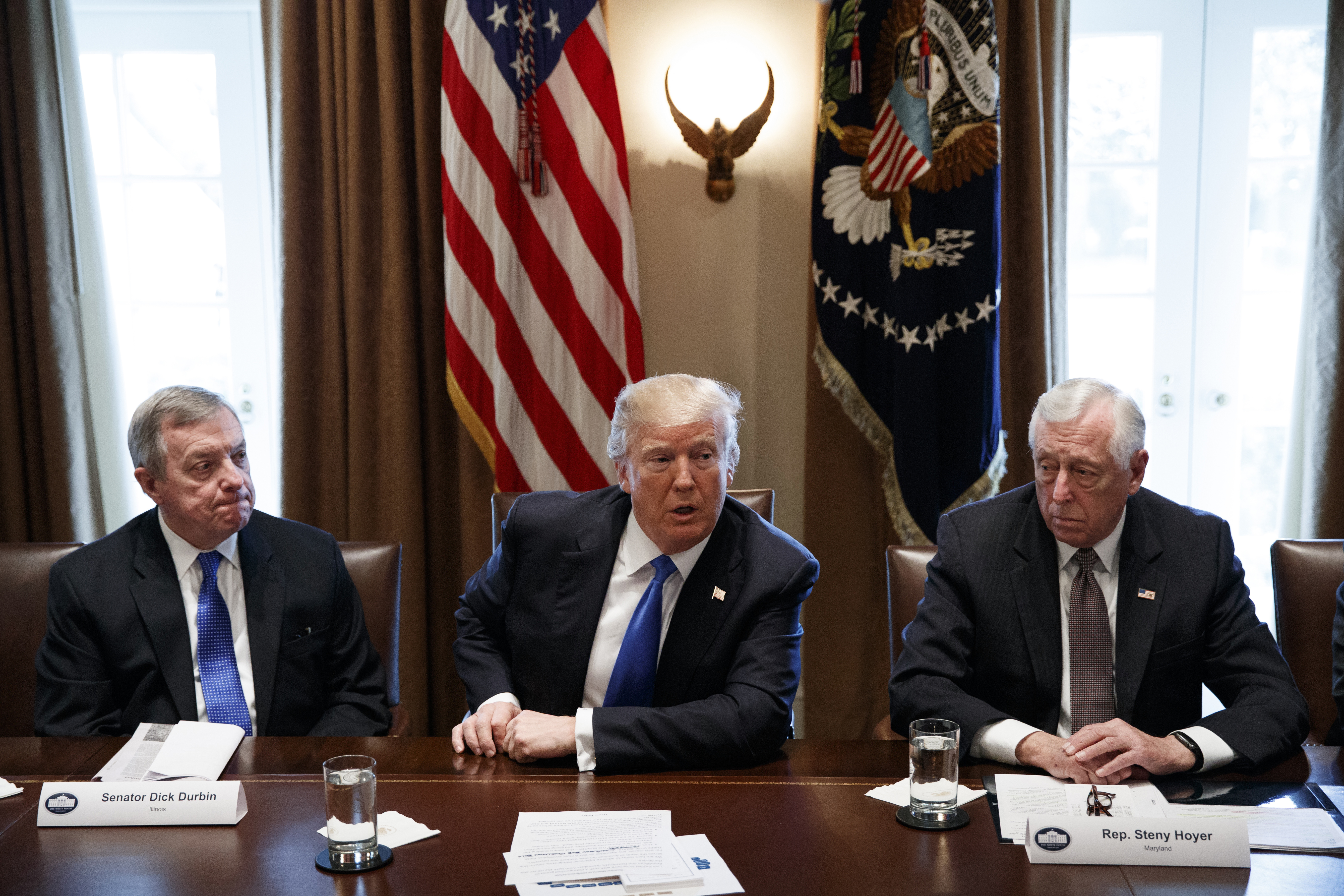
By ALAN FRAM
ANDREW TAYLOR
Associated Press
WASHINGTON (AP) — Three Republican and three Democratic senators said Thursday they’d reached an election-year accord to protect hundreds of thousands of young immigrants from deportation and to bolster border security. But the White House and several GOP lawmakers said they’d not accepted the proposal, plunging the issue back into uncertainty just eight days before a deadline that threatens a government shutdown.
Two of the bargainers — No. 2 Senate Democrat Richard Durbin of Illinois and Sen. Lindsey Graham, R-S.C. — traveled to the White House early Thursday to shop their framework to President Donald Trump in the Oval Office. The pact also includes restrictions on immigrants’ abilities to bring relatives to the U.S. and termination of a visa lottery system that has helped gain entry for people from African and other diverse countries.
“I’m hopeful it will lead to a breakthrough,” Graham, who has forged a close relationship with Trump despite their prior political rivalry, told reporters afterward. But in an afternoon of drama and confusing developments, three other GOP lawmakers — including two hardliners on immigration — were also in Trump’s office for Thursday’s meeting and said it did not produce the results Graham and Durbin were hoping for.
“There has not been a deal reached yet,” said White House spokeswoman Sarah Huckabee Sanders. But she added, “We haven’t quite gotten there, but we feel like we’re close.” Underscoring the pitfalls facing the effort, other Republicans also undercut the significance of the deal the half-dozen senators hoped to sell to Trump. “How do 6 people bind the other 94 in the Senate? I don’t get that,” said No. 2 Senate Republican John Cornyn of Texas.
Cornyn said the six lawmakers were hoping for a deal and “everyone would fall in line. The president made it clear to me on the phone less than an hour ago that he wasn’t going to do that.” The six senators have been meeting for months to find a way to revive protections for young immigrants who arrived in the U.S. as children and are here illegally. Trump ended the Obama-era Deferred Action for Childhood Arrivals program last year but has given Congress until March 5 to find a way to keep it alive.
Federal agencies will run out of money and have to shut down if lawmakers don’t pass legislation extending their financing by Jan. 19. Some Democrats are threatening to withhold their votes — which Republicans will need to push that legislation through Congress — unless an immigration accord is reached.
Cornyn said the real work for a bipartisan immigration deal will be achieved by a group of four leading lawmakers — the No. 2 Republicans and Democrats in both the House and Senate. That group met for the first time this week.
The immigration effort seemed to receive a boost Tuesday when Trump met with two dozen lawmakers and agreed to seek a bipartisan way to resuscitate the program. The group agreed to also include provisions strengthening security — which for Trump means building parts of a wall along the border with Mexico — curbing immigrants’ relatives from coming here and restricting the visa lottery.
Also in Thursday’s Oval Office meeting were House Majority Leader Kevin McCarthy, R-Calif., and two conservative lawmakers who’ve taken a hard line on immigration: Sen. Tom Cotton, R-Ark., and House Judiciary Committee Chairman Bob Goodlatte, R-Va. One person with direct knowledge of that meeting said Durbin and Graham hadn’t expected the three GOP lawmakers to be there. It was unclear why the three other Republicans attended. A Republican with knowledge of Thursday’s meeting said the White House hastily invited Cotton to join the immigration discussion.
That Republican said there were several hang-ups in the meeting, including whether thousands of immigrants into the U.S. from countries that have suffered disasters, including El Salvador, Guatemala and Haiti should continue to receive temporary protected status.
The bipartisan senators offered to end the visa lottery program in exchange for continuing that temporary protected status, one person said. Cotton later declared that Democrats have yet to give enough on border security and other immigration issues even though he and other Republicans are willing to bend on the issue of childhood arrivals.
“The American people don’t want that style of immigration reform,” Cotton told reporters about the bipartisan senators’ offer. “They certainly don’t want this pine needle of a proposal that was on the table today.” He later called it a “joke” of a proposal. Any immigration deal would face hurdles winning congressional approval.
Many Democrats would oppose providing substantial sums on Trump’s campaign promise to build a wall along the border with Mexico. Many Hispanic and liberal members of the party oppose steps toward curtailing immigration such as ending the visa lottery and restricting the relatives that legal immigrants could bring to the U.S.
Among Republicans, some conservatives are insisting on going further than the steps that Trump has suggested. They want to reduce legal immigration, require employers to verify workers’ citizenship and block federal grants to so-called sanctuary cities that hinder federal anti-immigrant efforts.



















